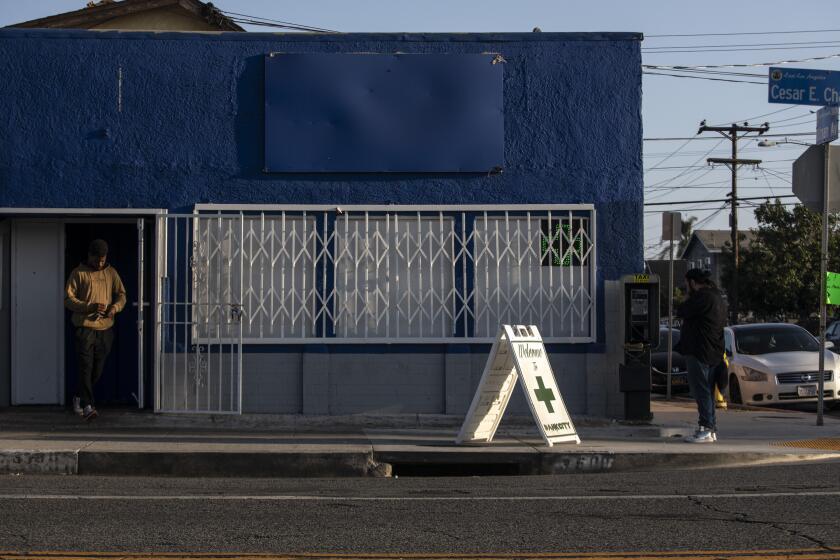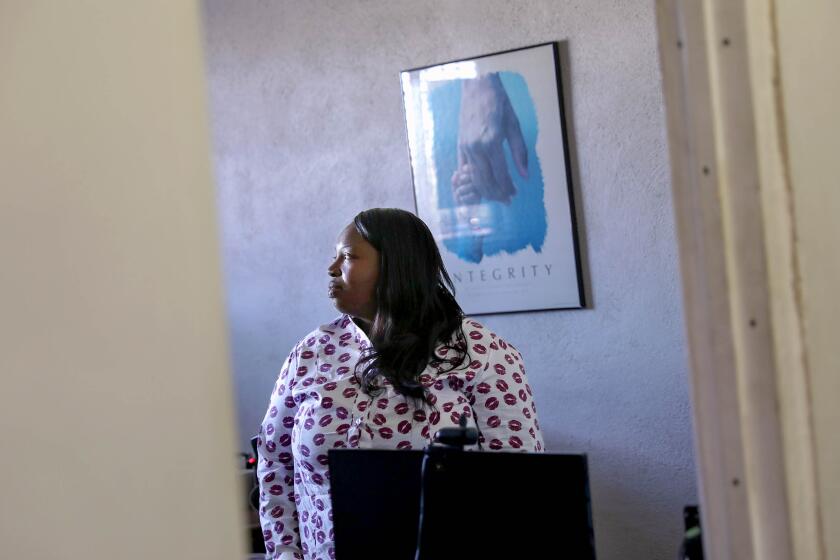
- Share via
In the San Gabriel Valley, a city councilman demanded bribes from businesses seeking cannabis licenses, according to a source cooperating with the FBI.
In another small L.A. County city, a cannabis industry group offered $15,000 to council candidates who would pledge to support changes to city regulations that weed businesses wanted — an exchange one legal expert said “flirted at the edges” of the law.
And in rural Northern California, an elected official pushed to expand the amount of weed that farms could legally grow, a proposal sought by a cannabis business that was paying her and her husband hundreds of thousands of dollars to buy their ranch.
California’s decision to legalize recreational cannabis in 2016 ushered in a multibillion-dollar commercial pot market that officials in many small, struggling communities hoped would bring new jobs and an infusion of tax revenue to spend on police, parks and roads. But for some cities, the riches never materialized.
Instead, the advent of commercial cannabis unleashed a wave of corruption, prosecutions and accusations that has rocked local governments across the state and left them with few effective tools to combat the problem.
Illegal cannabis farms are engulfing parts of California and exploiting farmworkers who labor in squalid, deadly conditions, a Times investigation finds.
From the rugged mountains near Oregon to the desert along the Mexican border, a Times investigation found corruption or other questionable conduct covering a vast area of activities: public officials demanding cash from cannabis business owners to approve licenses; government officials threatened with physical violence over pot regulations; and elected officials accepting money from cannabis businesses even as they regulated them. In addition, the industry has donated a torrent of campaign cash to local government officials as cannabis became a new and powerful special interest.
Lobbyists, pot entrepreneurs and public officials say bribery and shakedowns have become so commonplace in cannabis licensing that it feels like a normal part of doing business.
Ruben Guerra, board chairman of the Montebello-based Latin Business Assn., said he has worked with 10 applicants trying to obtain cannabis licenses from Southern California cities. He witnessed cash shakedowns of half those applicants and notified a retired FBI agent he knows.
“I was right in the middle of the negotiations, and [public officials] were telling me they need this much,” Guerra said, adding that the bribe request usually ranges from $150,000 to $250,000.
The corrupting flow of money has its roots in how California crafted its cannabis legalization law to regulate an industry that until recently operated underground. Proposition 64, the statewide measure that paved the way for commercial cannabis to launch in 2018, put the ultimate decision on where pot businesses could operate in the hands of cities and counties.

More than 12,000 licenses are active, a Times analysis of state data shows, but those are concentrated in a minority of California’s cities and counties, including many small, struggling communities that viewed cannabis and its potential tax revenue as a financial lifeline. More than half of cities and counties refuse to allow any type of operation, including recreational sales or farming. Those that do authorize pot businesses generally restrict the number of licenses, creating fierce competition among entrepreneurs looking to cash in.
Giving thousands of often part-time, low-paid officials across the state the power to choose winners and losers in the new “green rush” created fertile ground for corruption.
“You pay your way into one of the few spots,” said Dominic Corva, a sociology professor and co-director of the Institute for Interdisciplinary Marijuana Research at Cal Poly Humboldt. “Once the game was limited licensing … it was like, who gets to have it?”
The link between bribery and cannabis grew so quickly that FBI agents issued a public warning in 2019, saying the corruption threat was especially acute in Western states like California that had implemented this “decentralized” system.
In May, a cannabis business operator, Helios Dayspring, was sentenced to 22 months in federal prison for paying more than $30,000 in bribes to a San Luis Obispo County supervisor. In June, Jermaine Wright, the former mayor pro tem of Adelanto, was convicted of taking a $10,000 bribe from an FBI agent posing as a pot businessman in the high desert city in San Bernardino County. The city’s former mayor, Richard Kerr, is awaiting trial on charges of accepting more than $57,000 in bribes and kickbacks in exchange for helping cannabis businesses. Two more former government officials in Imperial County are serving federal prison sentences for taking pot-related bribes.
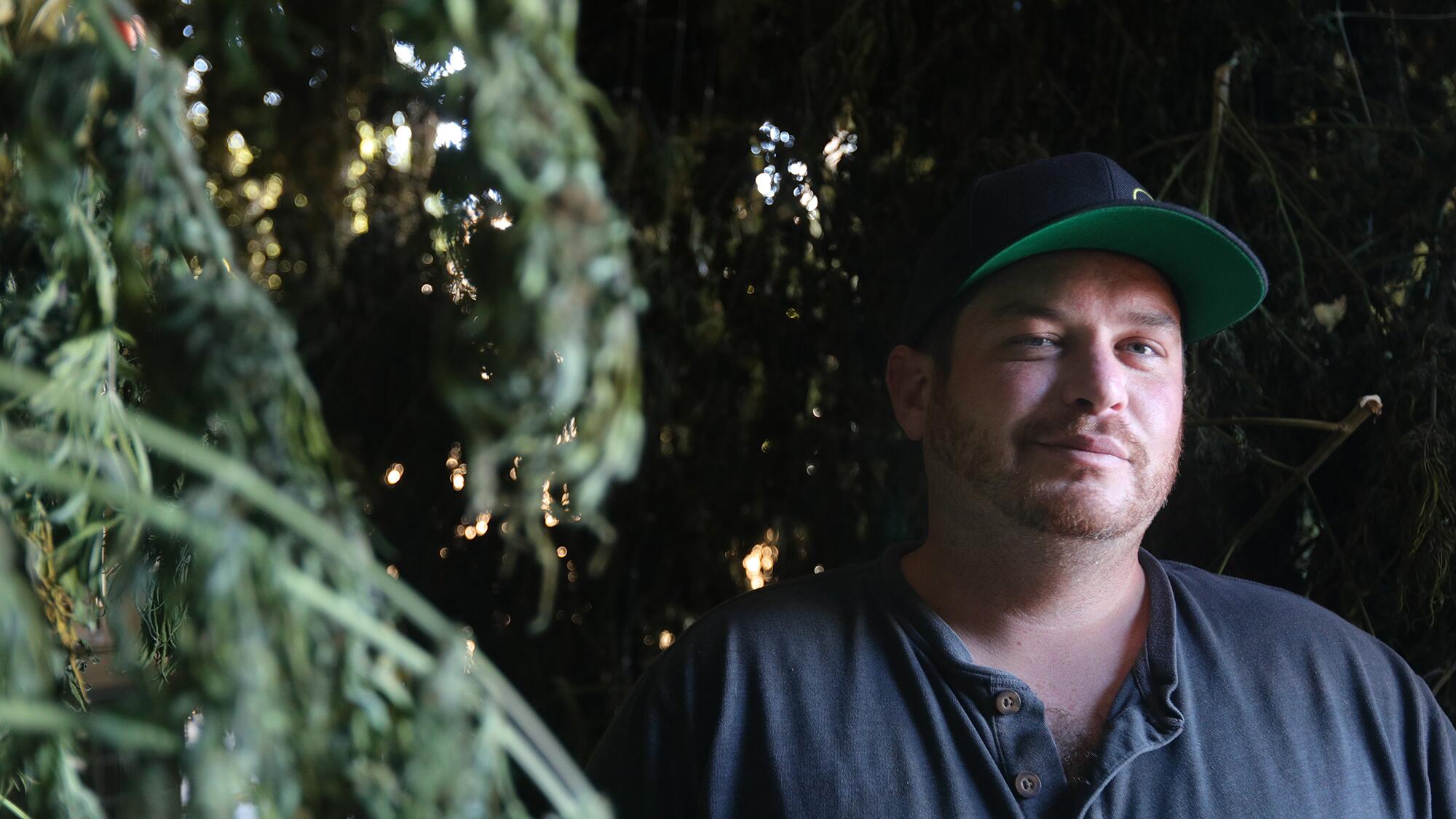


Accusations of wrongdoing also abound in civil court.
A legal malpractice case over a pot business in the small L.A. County city of Maywood boiled over in July when a lawyer introduced candid emails from several years earlier in which he accused a client of paying off the city’s mayor at the time, Ramon Medina, to secure a cannabis license, according to trial exhibits filed in the case. In an interview with The Times, Medina denied accepting money from the client, or even knowing him. Medina, who is no longer in office, has also pleaded not guilty to unrelated bribery charges filed last year.
A Times analysis of satellite imagery suggests California’s efforts to encourage cannabis growers into the legal market are foundering.
A former staffer to then-L.A. City Councilman Jose Huizar alleged in a lawsuit that he was fired as retaliation for informing the FBI, among others, that he believed Huizar was engaged in a scheme to obtain “cash payments” from cannabis applicants in exchange for permits. Huizar, who has pleaded not guilty to unrelated charges of taking bribes from downtown real estate developers, denied the allegation. The lawsuit was settled.
The situation has become so dire that some in the cannabis industry are calling for a radical solution. Adam Spiker, executive director of Southern California Coalition, a cannabis trade association, said corruption is so endemic in local cannabis licensing that cities and counties should consider banning people who want licenses from direct contact with the government officials who will make the decisions. Spiker said it’s the only way to ensure that licenses are awarded without any possible interference or influence by applicants.
“Is that a silver bullet? No,” he said. “But do things like that need to happen? Yeah, until [the corruption] goes away.”


Baldwin Park leaders saw cannabis as a financial boon for their struggling community in the heart of the San Gabriel Valley.
But from the start, pot licensing stirred allegations of corruption.
One of the licenses approved by Baldwin Park gave the exclusive right to distribute cannabis in the city to a local business, Rukli Inc. The city required other licensed weed businesses to use Rukli as their sole distributor. The arrangement prompted another cannabis business to file a lawsuit accusing Rukli of engaging in a conspiracy to secure an illegal monopoly and racketeering, including bribery and kickbacks. Rukli denied wrongdoing. The lawsuit was eventually dropped after Rukli pulled out of its exclusive deal.
Before the end of Rukli’s exclusive arrangement, a Baldwin Park police lieutenant visited the firm’s distribution center to make sure it was complying with the city’s requirements for securing the property. Lt. Chris Kuberry told The Times one of the firm’s partners mentioned paying $250,000 in cash to city officials.
Kuberry said that the comment was “certainly suspicious” and that he had heard the FBI was investigating possible corruption in the city. But he didn’t inquire further, file a report or contact the FBI. He said his department of about 50 officers was rife with complaints of retaliation and he feared for his job if he raised any questions.
“To be honest, [it was] out of self-preservation,” said Kuberry, who retired shortly after.
California’s legalization of recreational cannabis in 2016 ushered in a multibillion-dollar industry estimated to be the largest legal weed market in the world. But many of the promises of legalization have proved elusive. In an occasional series of stories, we’ll explore the fallout of legal pot in California.
In a lawsuit the city brought against its former police chief, Kuberry said in a sworn declaration that pot operators complained to him about “questionable business practices which included paying as much as $250,000 cash in a brown paper bag to city officials.” His declaration did not name the firms or their owners, but Kuberry told The Times he was referring to Rukli.
Scott Russo, an attorney for one of Rukli’s partners at the time, said the company never paid a bribe. He declined to comment on whether any city officials solicited bribes, citing an ongoing federal investigation.
“There’s a process [the FBI] would appreciate I respect,” he said.
A source who is cooperating with the FBI told The Times he was present when Ricardo Pacheco, then a member of the Baldwin Park City Council, asked that Rukli pay him $250,000 in cash to ensure the city would approve a license for the firm.
California’s legalization of recreational cannabis in 2016 ushered in a multibillion-dollar industry. But many of the promises of legalization have proved elusive.
The money was never paid, and at least one of the firm’s partners instead spoke to the FBI, said the source, who requested anonymity because of the ongoing federal investigation.
Pacheco and an FBI spokeswoman declined to comment.
Pacheco is awaiting sentencing after pleading guilty to a federal charge of bribery related to a contract with the city’s police union. FBI agents also raided the city attorney’s office and the homes of officials in other cities as part of an investigation targeting cannabis licensing in Baldwin Park and nearby cities.
Cruz Baca, who served on the council from 2013 to 2018, said in interviews with The Times that three men representing two other cannabis firms told her in 2018 that city officials shook them down for campaign contributions. All three, Baca said, alleged Pacheco solicited thousands of dollars in campaign money in exchange for approving a license. They did not say whether they paid the money. Campaign records show a $6,500 payment by the owner of one of the firms to Pacheco’s political action committee and no contributions from the other business. Both firms got licenses.
Baca said that she reported the allegations to Baldwin Park police officials.
Jason Adams, then a Baldwin Park police officer, confirmed that Baca informed him of complaints from pot businesses about cash “shakedowns” by Pacheco. He said he told the FBI weeks later about the bribery allegations against Pacheco.
Baca said she was contacted by the FBI four years ago and that she reported the businessmen’s allegations about Pacheco and others soliciting bribes. Agents, she said, also asked about other elected officials and pot consultants, and were looking at their links to cannabis interests in nearby cities, including Montebello.
“They were connecting dots,” she said.

Vanessa Delgado was the mayor of Montebello when two local property owners asked her to meet in 2018 to discuss where the city would allow cannabis businesses to operate.
At the meeting, she said, the men demanded Delgado vote to limit the city’s cannabis zone in a way that would benefit their properties.
“I was told if I didn’t go along with limiting the zones that my friends or those close to me would be hurt,” said Delgado, who soon afterward was elected to the state Senate. “It’s just my daughter and I who live alone. I was afraid.”
She declined to name the men out of fear of retaliation but said she informed a Montebello police officer.
The success of illegal cannabis shops and the struggles of legal ones in the heart of L.A.’s Eastside offer a stark illustration of how California’s legalization of marijuana has gone wrong.
The officer, former Lt. Julio Calleros, confirmed that Delgado contacted him about the alleged threat. He said she declined to file a police report, fearing that it could lead to physical harm.
“I could tell she was concerned about it,” Calleros said.
Still, Delgado said she refused to vote in favor of limiting the cannabis zone: “I wasn’t going to let that threat stop me from doing what was right.”
Delgado was part of a majority on the council that embraced weed. City officials publicly predicted that money from pot licenses could be used for road improvements and other community needs. The appeal was obvious for a suburban enclave of roughly 60,000 residents whose city government had spent years in the red.
But residents warned at council meetings about increased crime, especially around schools. Two of the five members on the council voted against the city’s cannabis regulations.
Council members on both sides were threatened with recalls.

In her bid for reelection to the council in 2018, Vivian Romero alleged on a campaign flier that “marijuana special interests tried buying my vote for $50,000.” Romero, who had voted against the city’s cannabis regulations, told The Times that the offer came from a cannabis businessman seeking a license in Montebello.
“The state has created a breeding ground for bribery and favoritism,” Romero said. “This is not hyperbole. These are facts.”
She said a pot consultant threatened to have her ousted from office unless she changed her position on the issue.
Cannabis companies and lobbyists poured about $40,000 into the city’s election, finance records show, helping defeat Romero and the other council member who had voted against Montebello’s pot regulations.

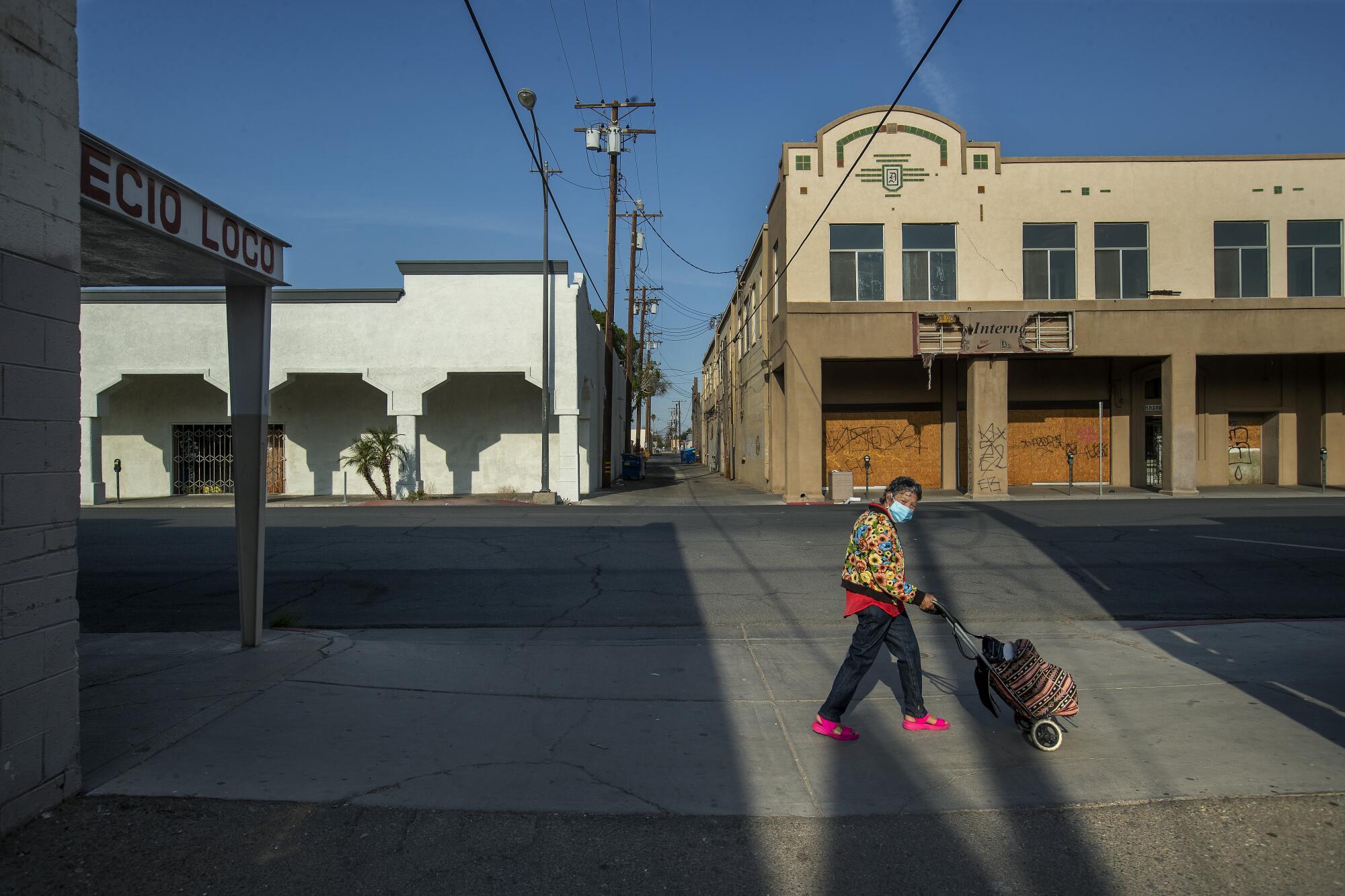
Few cities in California were as bullish on pot as Lynwood, one of a cluster of small towns in southeast L.A. County that have long struggled with financial woes and municipal corruption.
City leaders said cannabis would bring good-paying jobs and millions of dollars in revenue, and the town quickly gained a reputation as the next “mecca” of weed.
By 2018, cannabis interests had become a major power broker in the city’s political machine. But some pot business owners were unhappy and wanted changes. The local cannabis business association was pushing the city to extend the terms of licenses to the applicant’s lifetime and to provide a path for them to sell their licenses.
In that year’s election, the Lynwood Cannabis Assn. asked council candidates to sign a pledge card. The card promised that the signer would “fully support” the association and back “the industry and the efforts underway to modify the current city ordinance and development agreement for the members of the organization.”
“Let me know when each candidate signs it so I can give direction to the treasurer to issue the check,” one Lynwood Cannabis Assn. board member wrote to other leaders of the group in an email reviewed by The Times.
‘The state has created a breeding ground for bribery and favoritism. This is not hyperbole. These are facts.’
— Vivian Romero
In other emails, the association’s president, Tony Torres, asked one of the candidates, Candice Nunez, to sign the card and said she would receive “a check for $15,000 when you return the pledge card.” Torres promised in another email that the pledge cards would be kept confidential until after the election “to avoid anyone potentially using this information in a negative way toward your campaign.”
Nunez recalled thinking when she saw the card, “I’m selling my soul.”
Still, she signed and returned the pledge. She received the $15,000 check a few days later and showed it to a Times reporter.
She said she feared she might be engaging in illegal bribery and never deposited the check.
Nunez lost the election. Three candidates who won received a combined $40,000 from the cannabis association, according to campaign finance records.
Councilwoman Marisela Santana, who received $15,000, acknowledged signing the pledge. She said she already favored the association’s proposals because they were good for the city. “The best way to ensure that the cannabis industry grows in such a way that it doesn’t harm the community is to engage the industry and make policy decisions that benefit the Lynwood community first,” Santana said.
Torres, the association president, said in a brief interview that the pledge card didn’t result in any major legislative gains for the association. “Nothing came of it. We never brought it up again,” he said. He declined to comment further.
More than 30,000 Californians are stuck with felonies, misdemeanors and other convictions on their records that should have been wiped ‘automatically.’
City records show the council approved some of the association’s requests, including allowing businesses to sell their licenses.
Interest groups are allowed to ask election candidates to promise support for legislative causes and to offer campaign contributions as long as there isn’t an explicit cash-for-votes deal, legal experts said.
Prosecutors face a high bar trying to establish that a campaign contribution amounts to a bribe. They have to show an explicit quid pro quo agreement between the public official and the donor, and that there was corrupt intent.
Bob Fellmeth, a University of San Diego law professor and former white-collar crime prosecutor, questioned whether the Lynwood pledge’s language was specific enough to qualify as a bribe, but he said it “could be an interesting test case to bring.”
“They’re flirting at the edges of felony bribery,” he said. “They’re getting pretty close.”
No charges have been filed in connection with the pledge.
Nunez, the unsuccessful candidate who didn’t cash the association’s check, said she was introduced to the association during a meeting at Tequila Jack’s restaurant in Long Beach that was brokered by Aide Castro, a longtime Lynwood councilwoman.
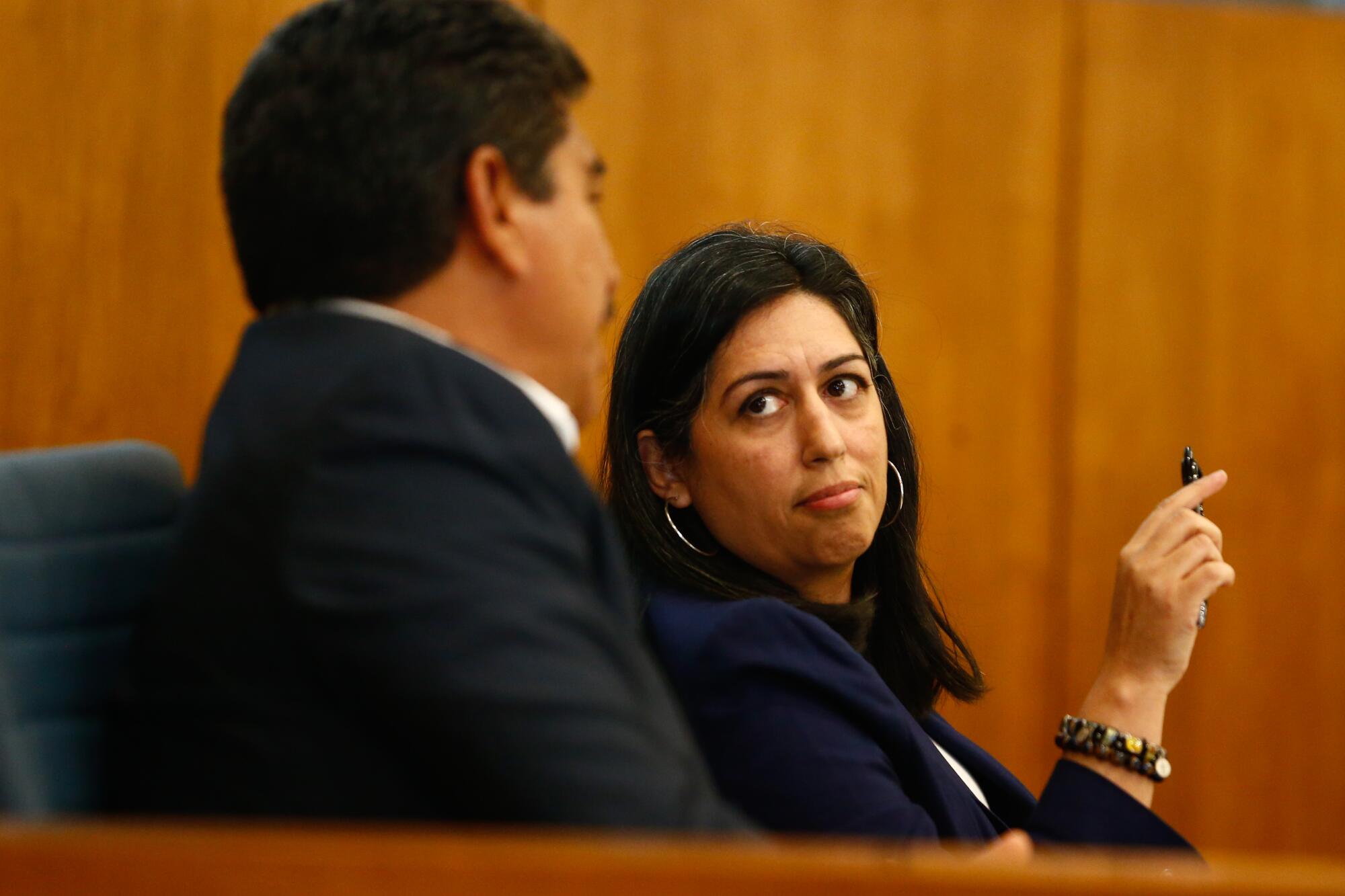
In 2017, Castro was on the payroll of the giant dispensary tracking app Weedmaps, earning $10,000 a month as a consultant — income she didn’t report on her financial statements as required by state law until she was questioned by The Times.
She did, however, disclose ownership stakes in two cannabis companies, which she estimated at the time to be each worth more than $1 million. She paid nothing for her shares in the companies, and told The Times that she received her ownership stakes in return for providing the businesses with her government expertise. Castro served on the council until the end of 2020, when she was termed out.
The California Fair Political Practices Commission, which enforces state law on disclosing such financial ties, opened an investigation into Castro’s links to cannabis. The inquiry, launched after The Times’ report more than three years ago, is ongoing.
Lynwood does not have its own ethics agency to conduct such inquiries. Few cities and counties do, which means there is little independent oversight of the financial relationships between local officials and the cannabis industry.
The Times identified more than a dozen government officials statewide who received income — ranging from thousands of dollars to hundreds of thousands — from cannabis companies or had interests in weed businesses while still in office. The payments are legal as long as officials disclose them and don’t cast votes that would financially benefit the firms paying them.
Even when legal, such arrangements raise doubts about whether government officials voting on cannabis issues are looking out primarily for the interests of the public or the interests of the pot industry, good government experts said.
“Maybe they’re completely ignoring their financial interests. ... Maybe they’re making decisions that are not in the best interests of their constituents because they’re trying to put some money in their pocket,” said Tracy Westen, a government ethics expert and founder of the now-shuttered Center for Governmental Studies. “At the very least, it becomes a public confidence issue.”
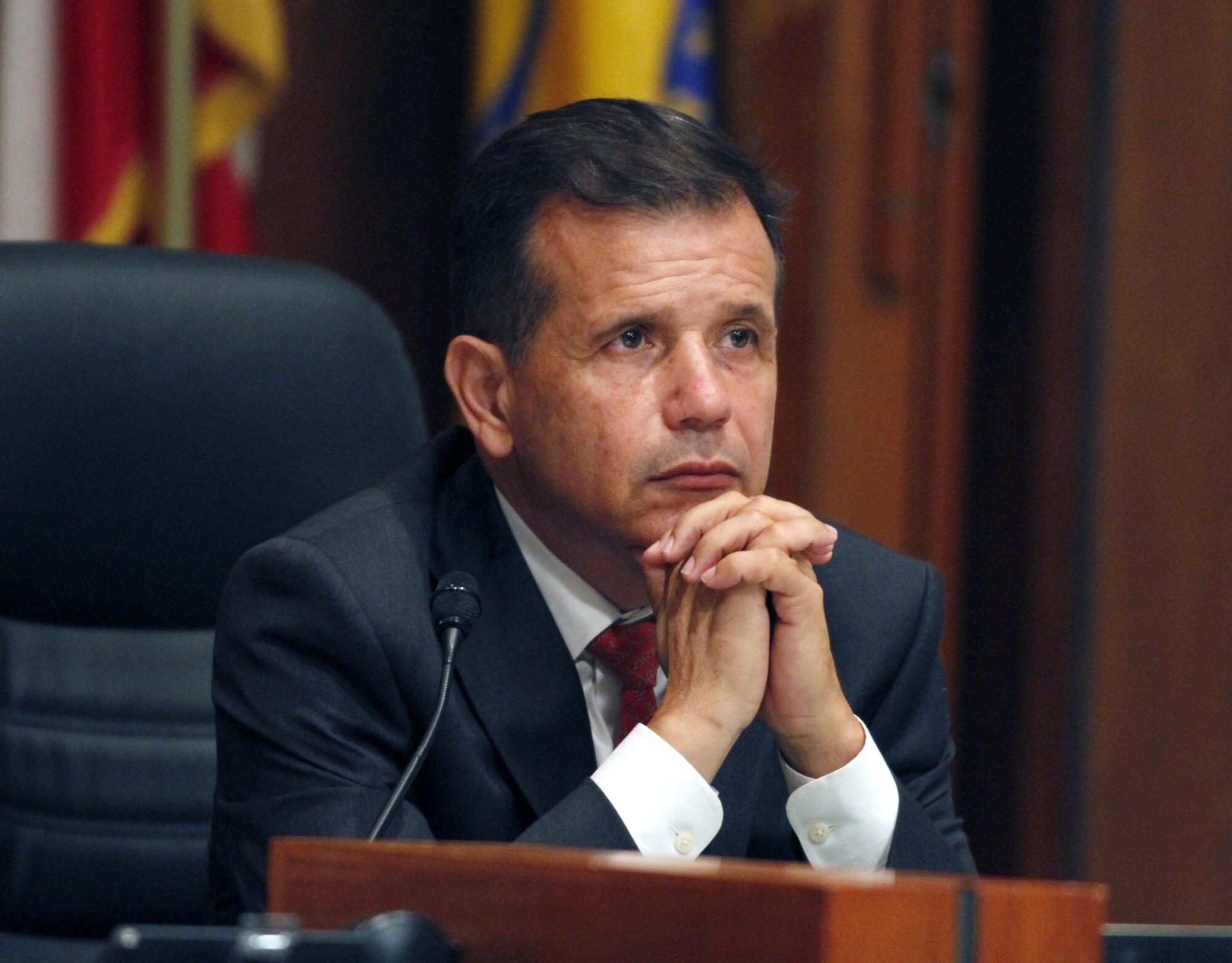
As Santa Ana’s mayor, Miguel Pulido helped reshape the city for more than a quarter-century. The Orange County city became a pioneer in the region for allowing medical marijuana dispensaries before the legalization of recreational pot.
Pulido has come under fire for his support of the cannabis industry. A former police chief said in a lawsuit that he passed along a report to the district attorney’s office alleging that Pulido had accepted $25,000 in exchange for guaranteeing a cannabis license, and sources told The Times four years ago that county and federal authorities launched criminal investigations of Pulido. He was never charged and denied wrongdoing.
In late 2020, Pulido testified in a sworn deposition that while mayor he received a $10,000 consulting payment from Touchstone, a licensed cannabis company operating in the city. Pulido didn’t report income from Touchstone on his statement of economic interests.
Responding to questions from The Times, an attorney for Touchstone denied the company paid Pulido but didn’t respond to questions about the deposition.
Pulido’s testimony detailed the work he did for the company, the amount he was paid and his close relationship with the company’s owner. He said he was paid to help the cannabis business get off the ground by putting the company in touch with others who sold the necessary equipment.
Santa Ana spokesman Paul Eakins confirmed that in April 2019 Pulido spoke to a staffer in the city’s planning division, which regulates cannabis, about whether Touchstone was required to build a wall to hide a carbon monoxide tank from the street. He said Pulido never asked for special treatment for Touchstone. Pulido, whose mayoral term ended in 2020, did not return phone calls from The Times.

In the far reaches of California’s northern region lies sparsely populated Trinity County, part of the famed Emerald Triangle, a wide expanse of lush forest and mountains renowned for its high-quality weed. Whether to allow cannabis farms to operate became a lightning-rod issue in the county’s rural communities, with some blaming pot for destroying an idyllic way of life.

In 2018, county Supervisor Barbara “Bobbi” Chadwick and her husband sold their 80-acre ranch to a pot farming company, Family Trees LLC, for $1.5 million, court records show. Family Trees agreed to pay for the property in installments.
As the monthly payments arrived, Chadwick urged her colleagues on the board to allow pot farmers to grow far more cannabis. Family Trees’ head grower sent an email to Chadwick and other supervisors in support, asserting that removing limits on pot growing would allow the farm to “once again send profits back into the [local] economy,” according to county records.

But a majority of the board voted to sharply curtail how much cannabis a licensed farm was allowed to grow.
At a candidate’s forum in 2020, Chadwick said she had no relationship with a cannabis business and only used the drug as medicine for ailing relatives. She did include the sale of the ranch on a financial disclosure statement filed for 2018 but did not disclose on subsequent statements the ongoing payments from Family Trees.
Chadwick, who served on the board from 2017 until 2021, told the California Fair Political Practices Commission that Family Trees also paid her husband’s contracting firm more than $96,000 for work the company did on the ranch from 2018 through 2020, according to county emails obtained by The Times under a public records request. She did not detail those payments on her financial disclosure statements.
Chadwick declined to answer questions from The Times, saying during a brief phone interview last year only that she has no financial interests in cannabis in Trinity County. In a lawsuit filed a day before the interview, she and her husband claimed Family Trees owed them hundreds of thousands of dollars in outstanding payments for the ranch. Chadwick and her husband had been receiving annual payments of $180,000 and monthly payments of $1,900 from Family Trees since June 2018, but the firm was no longer paying in 2021, according to court records. The couple’s lawyer said the dispute was resolved; the suit was dismissed in January.
The promise of ‘social equity’ has been a key narrative tied to California’s legalized pot industry. So far, efforts have been mired by costly delays.
Attorney Charles M. Farano, who represented Chadwick and her husband in the lawsuit, said that she had no interest in the firm’s pot business and that the purchase agreement was solely for the land and “had nothing to do with cannabis.” He said her “voting record on the cannabis business in general stands and is based upon her position regarding cannabis.”
“She has never had a conflict of interest regarding cannabis and currently has no conflict in these regards,” Farano said, adding that Chadwick “has complied with all disclosure laws.”
Brad Gilbert, a longtime friend of the Chadwicks who incorporated Family Trees and oversaw its county license application, said the firm followed all state and county procedures and has created jobs for local residents.
Trinity County Administrative Officer Richard Kuhns told The Times shortly before his retirement in May that he was concerned at how quickly planning department staff processed Family Trees’ license and questioned whether it was properly handled.
“It just stinks all around,” Kuhns said.

For the city of Calexico, the promise of cannabis was too good to pass up.
The small border community in Imperial County was desperate. City officials were considering layoffs of essential workers, and 20% of the 40,000 or so residents were living in poverty.
By permitting cannabis businesses, council members argued, money would pour into local coffers and bring better times.
“I truly believe that God has it here for a reason,” the city’s mayor, Armando Real, said at a June 2017 council meeting where he and his colleagues voted to allow pot businesses.
But instead of blessings, cannabis brought disgrace.
In late 2019, a businessman known simply as Manny met with two local government officials — Councilman David Romero and a city commissioner, Bruno Suarez. Manny drove a white BMW and wore guayabera shirts and a leather jacket. A clean-cut 30-something, he was an avid NFL fan and sprinkled his conversations with Mexican slang.
Inside a downtown café decorated with colorful posters and images of artist Frida Kahlo, Manny said he and his partners in L.A. wanted to open a dispensary. Suarez offered to help for a price — $35,000.
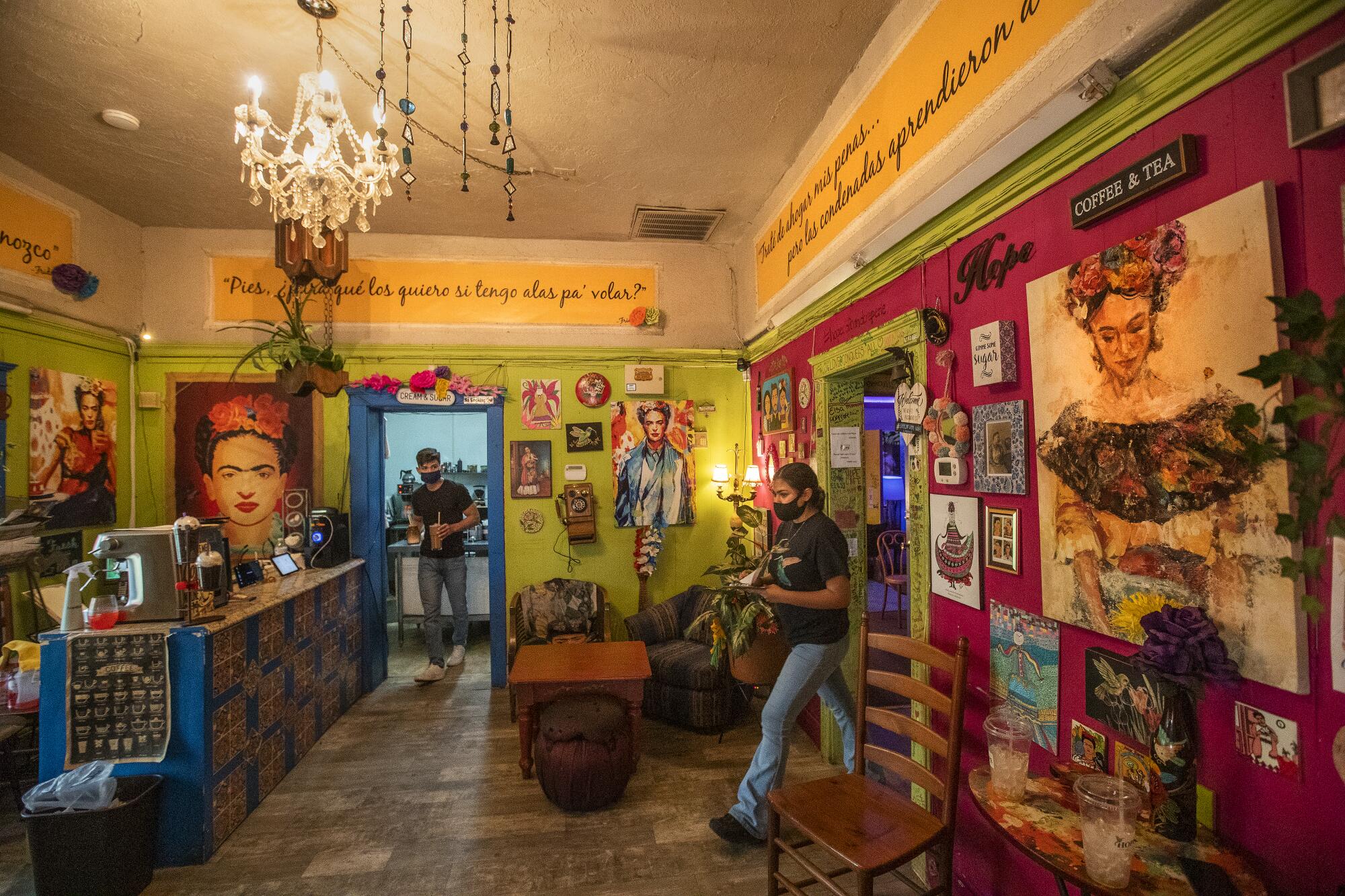
Suarez said the money “guarantees you a … top spot in the queue” for city permits. Romero noted that he had the authority to revoke other applicants’ permits and could push Manny’s to the front.
In early January 2020, the three men met again at an Italian restaurant in neighboring El Centro. After bonding over beers and wood-fired pizza, the men headed to the parking lot where Manny handed Suarez two envelopes containing a total of $17,500 in cash.
“We’re good?” Manny asked.
“Trust me,” Romero responded. “In my line of business, I can’t f— up.”
In late January, the three men met again at the Italian restaurant and Manny handed Suarez envelopes stuffed with $17,500 in cash.
Moments later, federal authorities swooped down and arrested the two officials. Manny, it turned out, was an undercover FBI agent. His conversations with the two officials had been recorded and were documented in court filings by federal prosecutors.
Romero and Suarez pleaded guilty to conspiracy to commit bribery and were sentenced in May 2021 to two years in prison.
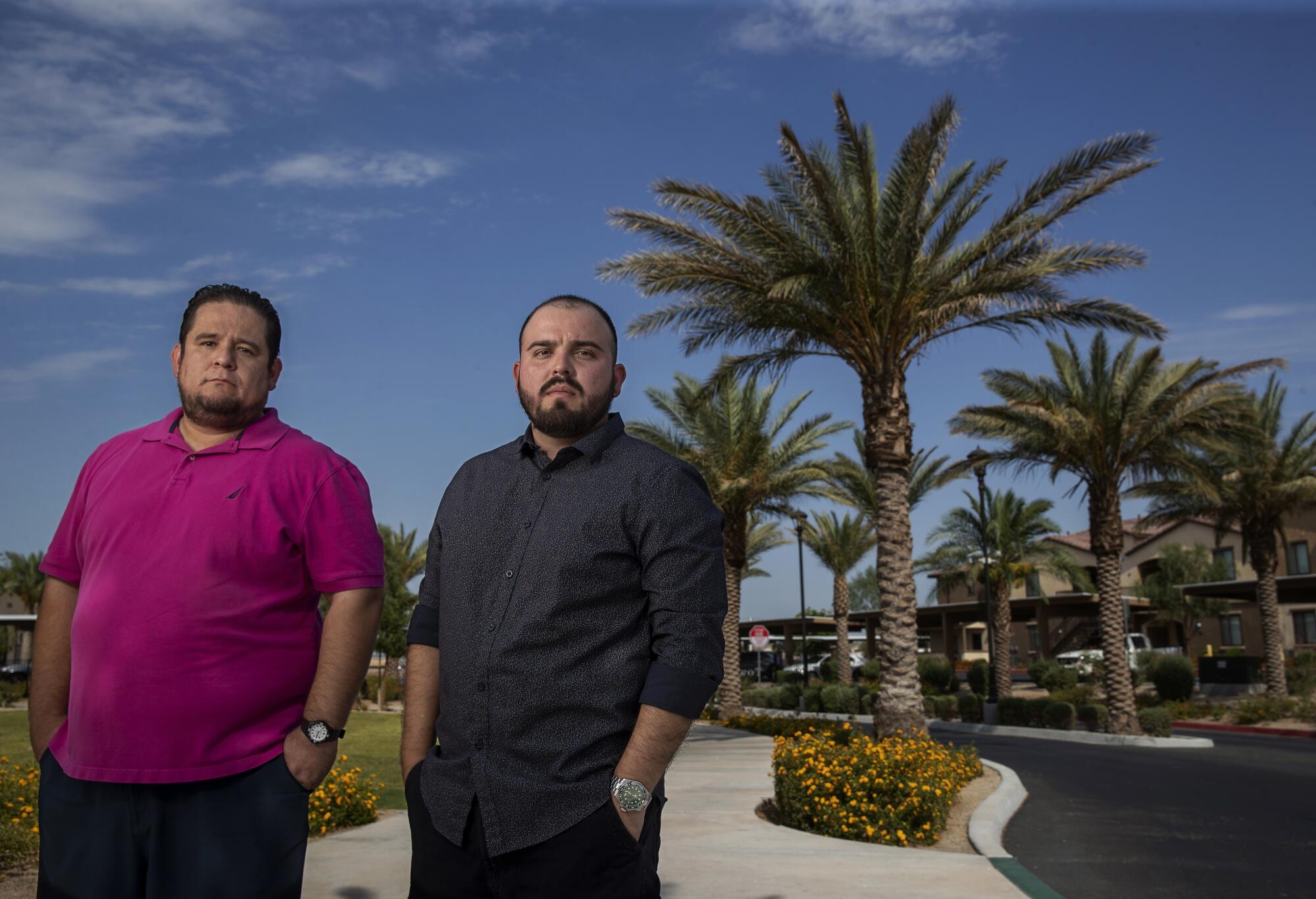
Beyond public embarrassment, Calexico has little to show for its embrace of weed. Major cannabis projects never materialized. Nor did the anticipated jobs or $700,000 in annual tax revenue that had been projected. The city has taken in only about $220,000 since first issuing licenses in 2018.
In interviews with The Times before they reported to federal authorities in June 2021, Romero and Suarez said the undercover agent led their conversations, but both expressed remorse and said they made mistakes.
A key error that officials made, Romero said, was to limit the number of dispensary licenses in the city. That created tense competition for just 12 permits and an incentive for people to try to game the system.
“If you put a number on it, you’ll turn it into a political mess,” Romero said of the process, hours before he was remanded to the custody of U.S. marshals.
“It was just a ticking time bomb.”
Times researcher Scott Wilson and Times Staff Writer Aida Ylanan contributed to this report.
More to Read
Credits
Editor: Jack Leonard
Photographers: Brian van der Brug, Glenn Koenig, Mel Melcon, Kent Nishimura
Photo Editing: Keith Bedford
Illustrations: Leonardo Santamaria
Copy Editing: Jim Buzinski
Page Design: Hamlet Nalbandyan
Audience Engagement: Javier Panzar
Sign up for Essential California
The most important California stories and recommendations in your inbox every morning.
You may occasionally receive promotional content from the Los Angeles Times.




